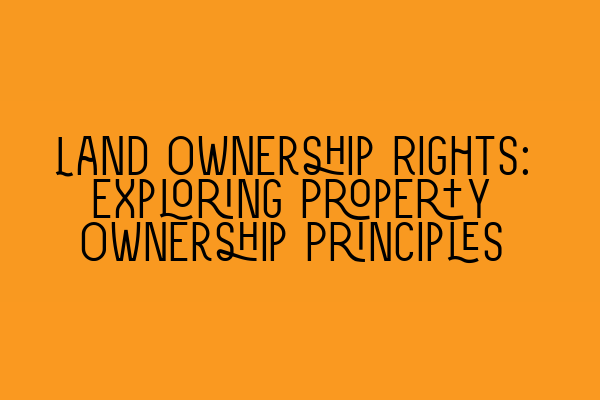Land Ownership Rights: Exploring Property Ownership Principles
When it comes to property ownership, understanding the rights and principles that govern land ownership is crucial. Whether you are an individual considering purchasing a property or a business looking to invest in real estate, having a solid grasp of land ownership rights will help you make informed decisions and protect your interests.
1. Legal Ownership
In the UK, legal ownership of land is based on a system called “registered land,” which is maintained by the Land Registry. Registered land provides a clear record of who owns a property and any registered interests or rights that may exist. It is important to consult the Land Registry when buying or selling land to ensure a transparent and valid ownership transfer.
Understanding the concept of legal ownership is essential to avoid any legal disputes or complications. The legal owner of a property has the right to possess, use, and enjoy the land, as well as the right to exclude others from it. These rights are subject to legal limitations and restrictions.
2. Possession and Possessory Title
Possession of land defines the physical control and occupation of a property. However, possession alone does not always guarantee legal ownership. Possession can be a complex issue, especially when it comes to unregistered land.
In cases where the ownership of land is unclear or undocumented, possessory title may be granted. Possessory title provides a legal recognition of ownership based on a person’s continuous and exclusive possession of land for a specified period. Obtaining possessory title requires satisfying specific legal criteria and going through the appropriate legal process.
3. Easements and Rights of Way
Easements and rights of way are important considerations when it comes to land ownership. An easement is a legal right that allows someone who does not own the land to use a portion of it for a specific purpose, such as accessing their property or utilities.
Rights of way, on the other hand, are easements that provide a legal right of passage over someone else’s land. These rights can be established through long-standing usage, express agreement, or legal provisions. It is essential to understand any existing easements or rights of way that may affect your property before making a purchase or sale.
4. Leasehold and Freehold Ownership
When it comes to property ownership, two common terms you will encounter are leasehold and freehold. Leasehold ownership grants the right to occupy a property for a specified period, subject to the terms and conditions outlined in the lease agreement. Freehold ownership, on the other hand, grants full ownership of both the property and the land it sits on without any time restrictions.
It is important to understand the differences between leasehold and freehold ownership and their implications when buying or selling property. Leasehold properties may involve additional costs, such as ground rent and service charges, while freehold properties offer greater control and flexibility.
5. Co-Ownership and Joint Tenancy
Co-ownership occurs when more than one person owns a property together. There are two main types of co-ownership: joint tenancy and tenancy in common.
Joint tenancy is a form of co-ownership where each party has an equal share in the property. If one joint tenant passes away, their share automatically transfers to the surviving joint tenants, regardless of any provisions in their will. This concept is known as the “right of survivorship.”
Tenancy in common, on the other hand, allows co-owners to have unequal shares in the property, and their shares can be individually sold or inherited according to their will. It is important to establish the type of co-ownership and the respective shares to avoid disputes and to understand the rights and responsibilities of each co-owner.
Understanding the principles and rights that govern land ownership is crucial for anyone involved in property transactions or investments. By familiarizing yourself with legal ownership, possession and possessory title, easements and rights of way, leasehold and freehold ownership, and co-ownership, you can make informed decisions and protect your interests.
For more information on related legal topics, we invite you to read the following articles:
- Understanding Contractual Capacity: Rights and Limitations
- Interactive SQE Mock Tests for Contract Law: Test Your Knowledge
- Join Our SQE Contract Law Webinars: Expert Insights and Guidance
- Contract Law Reforms: An Analysis of Recent Changes
- Parties in a Contract: Rights and Responsibilities
